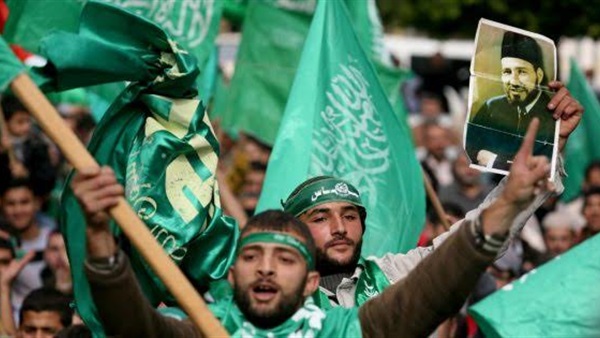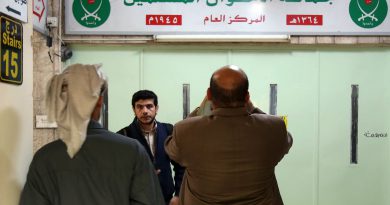ANALYSIS: The West Continues to Mishandle the Muslim Brotherhood
The recent Prevent review in Britain revealed that counter-extremism authorities continue to engage and even to fund extremist groups, including the Muslim Brotherhood.
The Muslim Brotherhood, the mothership of the Islamist movement, is often thought of as a Middle Eastern phenomenon that has only recently spread to the West. In fact, the group has had links to the West from early in its history. The difference is that in the last few decades, the Brotherhood has acquired a larger presence within Europe and the Western Hemisphere, and found its way to greater positions of social and political influence.
The Brotherhood, founded in Egypt in 1928 by the former schoolteacher Hassan al-Banna, originated as a project to answer the question of state legitimacy after the Ottoman caliphate was swept away in 1924. Branches of the group spread throughout the Middle East in the 1930s. In the 1940s, the Brotherhood developed its connections in the West, becoming one of the primary Arab allies of Nazi Germany. The Nazi revolution against Christian Europe was thwarted, but the Brotherhood’s encounter with Nazism had a lasting impact, particularly on the group’s ideology, intensifying the Brotherhood’s already militant antisemitism and sharpening its anti-Western outlook.
Al-Banna was killed in 1949, but this did not stop the Brotherhood’s growth. To the contrary. The Brotherhood reached the height of its power in Egypt in the early 1950s after the “Free Officers” military coup, led by Gamal Abdel Nasser, against the constitutional monarchy. The Brotherhood’s alliance with Nasser quickly soured, however, and, after an assassination attempt against Nasser was pinned on the Brotherhood, a ferocious crackdown on the group was launched in 1954. The story would repeat in Syria in the 1970s and 1980s, where the Syrian Brotherhood—a more elitist outfit, with less mass appeal than the Egyptian branch—launched an armed revolt and was ruthlessly crushed.
It was the largely the refugees from these attempted seizures of power who formed the Brotherhood in Europe. Initially, the Brotherhood had not envisioned staying in Europe: they thought they were finding shelter for a brief period before they went home. In time the realisation set in—as they had to find jobs and had children—that the Brethren were in Europe to stay. The Brotherhood thus began creating educational institutions and advocacy organizations to propagate for their ideology.
The Brotherhood in Europe has set up an intricate web of interconnected yet autonomous structures that are often “deniable” parts of the Brotherhood structure, even as they coordinate with each other at various levels to push the Brotherhood agenda on the Continent and maintain contacts with the Brotherhood’s central apparatus in Egypt. A lot of the early Brotherhood activity in Europe concentrated in Germany, but has since then spread out.
An interesting case study is Italy. For violent jihadists, even the Islamic State (ISIS), Italy has been something of an exception to their general rule of conducting attacks whenever possible. While there have been ISIS terrorist attacks in Italy and other plots have been thwarted, these are comparatively rare. Italy is viewed by jihadists primarily as a recruitment and logistics hub, not least because it is often the arrival point for migrant waves in which jihadists hide. The upshot is jihadists understand that too much terrorism within Italian borders would provoke the state to a crackdown that disrupts their operations on the rest of the Continent.
This lackadaisical attitude of the Italian authorities with even violent Islamists is redoubled when it comes to the “non-violent” or “participationist” Islamists like the Brotherhood, which tactically (overtly) eschew the use of terrorism as they spread their extremism, which often prepares the way for terrorist groups to find recruits. Such was the case with the Bosnian jihad in the 1990s: it was often Brotherhood-controlled mosques and Brotherhood-influenced Muslim communities that provided the foreign fighters to Al-Qaeda and its allies.
A recent European Eye on Radicalization report by Dr. Tommaso Virgili and Giovanni Giacalone described the situation: “[The Muslim Brotherhood] has been present in the Italic Peninsula since the early 1970s, when Middle Eastern university students in Perugia — a number of whom were affiliates and sympathizers of the Muslim Brotherhood — formed the Union of Muslim Students in Italy (USMI). The ideological posture of USMI emerged clearly from its first publications, where it translated the writings of MB ideologue Sayyid Qutb and his Subcontinental counterpart, Abu A’la al-Mawdudi”.
“Two decades later, these students, mainly Syrians, Jordanians, and Palestinians, became the major representatives of a new organization, born in 1990, known as the Union of Islamic Communities and Organizations in Italy (Unione delle Comunità Islamiche d’Italia or UCOII). A member of the Council of European Muslims (CEM), formerly known as the Federation of Islamic Organizations in Europe (FIOE), UCOII is now ‘the flagship public organization of the Brotherhood milieu in Italy’. … On the one hand, the organization is very active on the political and societal scene — as it attempts to become the main, if not the only, interlocutor of the Italian institutions — and on the other hand, it constantly generates controversies due to its connections with the Muslim Brotherhood (vainly denied16) and because of its problematic stances on sensitive issues…Islamist organizations in Italy share not only similar ideological tenets, but also similar objectives — namely, public recognition, representation, and access to public funding”.
As the authors explain, the Brotherhood and its derivatives have been markedly successful in this, partly by forming an alliance with the political Left in Italy. This phenomenon, sometimes called “Islamo-gauchisme” (Islamo-Leftism) at the present time, is not new: the late Shah of Iran identified the extremists who led the Revolution against him as an “unholy alliance” between “the Red” (far-Left) and “the Black” (Islamists). Relatedly, the Brotherhood in Italy has expanded its reach by close cooperation with militant Shi’ites controlled by or inspired by the Islamic Republic in Iran that emerged from the Revolution that toppled the Shah. Again, this is not new: the Iranian regime has long supported Al-Qaeda, and, indeed, Al-Qaeda’s new leader might well be based in Iran.
The authors noted that Italy was lagging behind other European countries in attending to this matter: “In Europe, countries like France and Austria have already taken steps to contrast the infiltration of Islamists, not only in the Muslim community, but also in politics and academia. Italy, where Islamists are particularly active today, needs to take a clear stance on this matter”.
A recent example of this has surfaced, with the inauguration of the Italian Institute of Islamic and Humanistic Studies (BAYAN) in Verona. Ostensibly designed to promote cross-cultural understanding, BAYAN is connected to the International Union of Muslim Scholars, which was created by the late Brotherhood cleric Yusuf al-Qaradawi and is designated as a terrorist organization by several states for its promotion of extremism and violence. Al-Qaradawi’s license for suicide bombing and his sectarian preachments have inflamed already volatile situations and led to much death and destruction.
Italy is not the only Western state that continues with these missteps. The recent Prevent review in Britain revealed that counter-extremism authorities continue to engage and even to fund extremist groups, including the Muslim Brotherhood. In an increasingly unstable and dangerous world, it is important that states do not lend legitimacy to extremist groups that empowers them within society, especially since the Brotherhood itself is showing severe signs of stress and fragmentation. Extending a life raft to such a deleterious organization at a moment when it is sinking of its own accord is the height of folly.
Article first appeared on European Eye on Radicalization.



